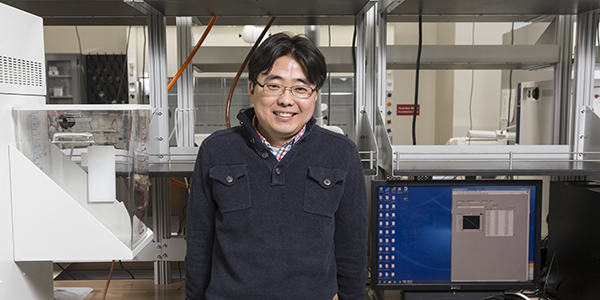Grants to fund research into antibiotic-resistant bacteria, bio-powered fuel cells
ECE Associate Professor Seokheun “Sean” Choi is a pioneer in biobatteries and bio-photovoltaics

Associate Professor Seokheun “Sean” Choi — a faculty member in the Department of Electrical and Computer Engineering at Binghamton University’s Thomas J. Watson College of Engineering and Applied Science — has received two significant federal research grants within the past few weeks.
Detecting antibiotic-resistant bacteria
The National Science Foundation awarded $370,000 to Choi for a three-year project for a more rapid way to test for antibiotic-resistant bacteria, which are an escalating problem in medical settings. According to the Centers for Disease Control and Prevention, 2.8 million antibiotic-resistant infections happen in the U.S. each year, and more than 35,000 people die from of them.
The research further expands on a paper Choi published in fall 2020 with PhD students Yang Gao, Jihyun Ryu and Lin Liu exploring how to detect for antibiotic-resistant bacteria using bacterial electron transfer, a chemical process that certain microorganisms use for growth, overall cell maintenance and information exchange with surrounding microorganisms.
A prototype detection device — built in part with previous funding from the National Science Foundation— has eight sensors printed on its paper surface, but that could be extended to 64 or 96 sensors if medical professionals wanted to add other tests.
“This new NSF project will establish an innovative strategy to revolutionize antibiotic susceptibility testing techniques, especially for bacterial biofilms,” Choi said.
“The project outcomes will address grand challenges in microbial infections critical to U.S. healthcare and the economy, through enabling sensors that will augment human health, safety and well-being by providing information to effectively treat the infections and better control the spread of the antibiotic resistance,” he added.
Bio-photovoltaic panels
Choi also received a three-year, $510,000 grant from the U.S. Office of Naval Research (ONR) for the project “Plug-n-Play Micro-Bio-Photovoltaic Panels” This project will create a self-sustainable and scalable micro-bio-photovoltaic panel by connecting multiple miniature bio-photovoltaic modules in an array with “plug-n-play” capability.
Bio-photovoltaics is an emerging technology that can generate electricity from photosynthetic water-splitting by subcellular non-living proteins or cellular living organisms.
While Choi’s previous ONR grant offered performance enhancement of individual micro-bio-photovoltaic cells, this new project will demonstrate a high-performance power generator that can be self-sustainable in natural settings and act as a power supply for real-world wireless sensor network applications.
His recent prototype micro-bio-photovoltaic cell will be improved by integrating an electrochemically active and sustainable “living bioelectrode” that includes a mix of microbes engineered to work together.
Seamless integration of the organisms in an conductive polymer will improve the power and lifetime of the bio-photovoltaic cells. The self-sustainable capability can be enhanced by a self-healable packaging layer that harnesses ambient moisture for photosynthesis and heals damage from operation in unfriendly environments.
Choi’s long-term goal is to develop a stand-alone, fully functional bio-fuel cell system to provide sustainable power for field applications, which include devices used in difficult to reach, dangerous and harsh environments.
His research group has been recognized as a pioneer in biobatteries and bio-photovoltaics, and a recent review shows the full scope of miniaturized bio-photovoltaics and their techniques.

